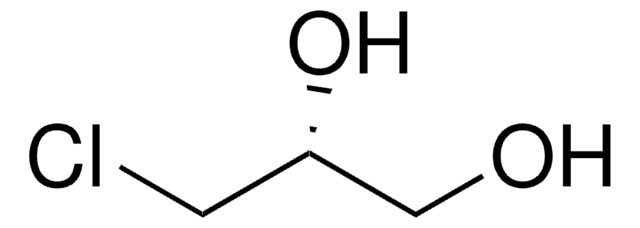184489
1,3-Dichloro-2-propanol
97%
Synonym(s):
Glycerol-α,γ-dichlorohydrin
About This Item
Recommended Products
Quality Level
Assay
97%
form
liquid
refractive index
n20/D 1.483 (lit.)
bp
174.3 °C (lit.)
mp
−4 °C (lit.)
solubility
water: soluble 10 part
alcohol: miscible
diethyl ether: miscible
density
1.363 g/mL at 20 °C
1.351 g/mL at 25 °C (lit.)
functional group
chloro
hydroxyl
SMILES string
OC(CCl)CCl
InChI
1S/C3H6Cl2O/c4-1-3(6)2-5/h3,6H,1-2H2
InChI key
DEWLEGDTCGBNGU-UHFFFAOYSA-N
Looking for similar products? Visit Product Comparison Guide
General description
1,3-Dichloro-2-propanol is used as a pharmaceutical intermediate and solvent for paints, lacquers, and epoxy resins.
Application
- Hydroxyl-N-tosylcyclams via sodium ethoxide catalyzed cyclization reaction with di(poly)-N-tosylamides.
- (R)-Epichlorohydrin using biocatalysts.
- 1,3-dichloropropene, a soil fumigant, and synthetic glycerol.
It can also be used as an intermediate in the production of epoxy resins, as well as a solvent for hard resins and nitrocellulose.
Signal Word
Danger
Hazard Statements
Precautionary Statements
Hazard Classifications
Acute Tox. 3 Oral - Acute Tox. 4 Dermal - Carc. 1B
Storage Class Code
6.1A - Combustible acute toxic Cat. 1 and 2 / very toxic hazardous materials
WGK
WGK 3
Flash Point(F)
186.8 °F - closed cup
Flash Point(C)
86 °C - closed cup
Personal Protective Equipment
Regulatory Listings
Regulatory Listings are mainly provided for chemical products. Only limited information can be provided here for non-chemical products. No entry means none of the components are listed. It is the user’s obligation to ensure the safe and legal use of the product.
PDSCL
Poisonous substance
PRTR
Class I Designated Chemical Substances
FSL
Group 4: Flammable liquids
Type 3 petroleums
Hazardous rank III
Water insoluble liquid
ISHL Indicated Name
Substances Subject to be Indicated Names
ISHL Notified Names
Substances Subject to be Notified Names
JAN Code
184489-BULK:
184489-5G:4548173289724
184489-VAR:
184489-500G:4548173289922
184489-25KG:
184489-100G:4548173288956
Choose from one of the most recent versions:
Already Own This Product?
Find documentation for the products that you have recently purchased in the Document Library.
Customers Also Viewed
Our team of scientists has experience in all areas of research including Life Science, Material Science, Chemical Synthesis, Chromatography, Analytical and many others.
Contact Technical Service








